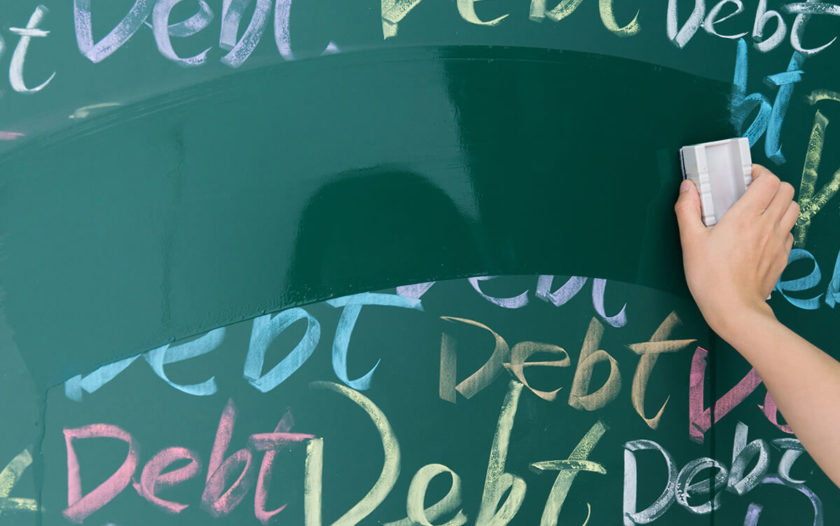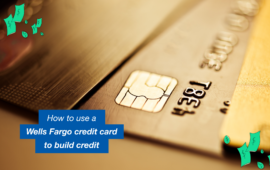How to Pay Off Credit Card Debt Fast
About Stefanie
Stefanie began her career as a journalist, reporting on options, futures, and pension funds, and most recently worked as a writer and SEO content strategist at a digital marketing agency. In her free time, she enjoys teaching Pilates and spending time with her daughter and Siberian Husky.
Read full bio
At a Glance
Having credit card debt can be overwhelming. You might feel like you don’t know how to begin paying off your debt, or confused about the different options available. Know that you’re not alone: In 2008, the average debt for cardholders with prime credit scores was over $8,000 per cardholder.1
In this article, you’ll learn:
Why getting out of credit card debt is so important?
There are many reasons why you should pay off your credit card bills. Debt can negatively affect your credit score, and what you owe can pile up with high interest rates from multiple cards. The more debt you amass today, the less money you’ll have tomorrow.
The dangers of revolving debt
Credit card debt is also known as revolving debt or revolving credit, and refers to an account with a lender that you can draw from up to a predetermined, monthly limit. You can pay the entire debt off on a monthly basis or make a minimum payment and begin accruing interest at high rates. Revolving debt payments are open-ended, meaning that if you’re not disciplined about paying those payments, the debt will continue to grow and compound.
Eight ways to pay off credit card debt fast
Managing your debt is crucial for your future financial security. Here are some of the best ways to get out of credit card debt quickly.
1. Pay over the minimum
You’re required to make a minimum payment each month on your card, but chances are it’s much lower than your actual balance. Consider paying more than the minimum balance on your card, because you’ll both get out of debt faster and owe less interest. Plus, paying off the bill as close to in-full as possible can help improve your credit score. Even just a little bit extra every month can add up.
You also aren’t limited to making just one payment a month, or waiting until the due date to pay down the balance. Because credit card interest is compounded daily, you may consider making two payments a month instead of one.
2. Divide and conquer
Instead of feeling paralyzed by the total amount of money you owe, set goals to pay off one smaller portion at a time. For example, it’s easier to think of paying four payments of $3,000 each, rather than a larger sum of $12,000. You can use debt repayment plans, such as the debt snowball or debt avalanche method, which can help focus your efforts and pay off your debt faster.
3. Focus on one goal
One field study showed that consumers who focused their repayment strategy on just one account—instead of trying to pay off multiple accounts at once—were more motivated and repaid their debt quicker.2
For example, you may want to prioritize paying off the account with the highest balance first, or the account with the highest interest rate.
4. Consider a 0% APR credit card
Balance transfers help consolidate your debt and decrease your interest rates. With a balance transfer, you move your credit card balance to a new card with a lower interest rate. The new card is basically used to pay off the owed balance of your old card.
Some balance transfer credit cards offer 0% introductory APR (annual percentage rate) and don’t add interest to your purchases for a specified amount of time, typically from 12 to 21 months.
However, some balance transfer credit cards charge a balance transfer fee, so factor that into your decision. Also, once the promotion is over, the card’s normal APR kicks in, so be sure to read the fine print and pay off the card as soon as possible. Some cards don’t tell you that your first large purchase or transferred balance has 0% APR, but other purchases might still be charged with the normal interest rates.
When exploring balance transfer options, consider the Wells Fargo Active Cash card, which often provides competitive introductory APR offers on balance transfers, allowing you to consolidate debt and manage payments more effectively. Alternatively, the Wells Fargo Reflect card is renowned for its low ongoing APR, offering a sustainable solution for debt consolidation and minimizing interest charges over time.
5. Consolidate
A debt consolidation loan is a low-interest personal loan that’s taken out to pay off high-interest debt. Debt consolidation allows you to get out of debt quickly, leaving you with just the loan to pay off in monthly installments.
If you have good credit, you may qualify for a low-interest credit card consolidation loan. These personal loans can be used to pay off your credit card in full, and then you’ll make one monthly payment to the new loan. Because the interest rates are typically lower than credit cards, you may save money in the long-run and pay off your debt faster.
Avoid personal loans that have high fees. And, if you don’t have excellent credit, you may not qualify for a low enough interest rate.
Real Stories
Carter Seuthe, the CEO of Credit Summit, found himself with $20,000 of credit card debt after a string of emergencies in his late 20s. With no savings, he had to act quickly. “So, I took advantage of a great credit score (as I was barely managing to make regular payments on all cards) to apply for and receive a personal loan I used to pay off all the cards. I think the most important step here for me was researching my options and securing a loan with a fixed, low interest rate that allowed me to make reliable payments until the full amount was paid off within a couple of years.
-- By Carter Seuthe, the CEO of Credit Summit
Below lenders will help you pay off your credit card debts.
Use the filters below to refine your search

Sorry, we didn’t find any options that meet your requirements. Please try modifying your preferences.
Congratulations! You’re close to seeing your offers!
Please take a second to review the details you shared earlier
Sorry, we didn’t find any options that meet your requirements. Please try modifying your preferences.
Learn more: 8 Ways to Consolidate Credit Card Debt
6. Contact your credit card company
If you’re having a hard time paying off your credit card and you’ve tried other options, be sure to contact your credit card company. First, make sure you understand your balances, interest rates, and due dates. Then, ask about any financial assistance they can offer.
Some companies may offer a lower interest rate, temporary payment reduction, or change in payment due date to better align with when you get paid. Others may waive fees.
7. Create and stick to a budget
One of the easiest ways to pay off debt is by adjusting the ratio of how much you earn and how much you spend. By spending less, you’re able to put more toward paying off debt. Analyze how much you make each month, and how much you spend on both necessary and unnecessary expenses. Figure out where you can cut unnecessary spending and put all of those funds toward paying off your credit card.
8. Talk to a credit counseling service
If you’re still struggling, you can get professional help from a nonprofit credit counseling service. They can help you analyze your overall financial situation and work with you to create a repayment plan. Some may even negotiate with credit card companies on your behalf to try to get a lower interest rate.
They will also help you to understand why you’re in debt in the first place, and offer education to avoid falling back into debt in the future. However, be sure to do your research before contacting a company to avoid credit counseling or debt consolidation scams.
Other ways to get out of debt
There are also other ways to manage your debt, each with its own pros and cons.
1. Avalanche method
The debt avalanche method is a debt repayment strategy that focuses on paying the minimum amount of each account, and then using whatever money is left to pay off debt, starting with the account that has the highest interest rate. Once that account is paid off, you move to the account with the next highest interest rate.
The good
Each account you fully pay off allows you to put more money toward the next account, since you’re eliminating the highest interest rates first.
The bad
By using the avalanche method, it may not feel like you’re getting anywhere. Cutting down interest expenses isn’t as satisfying as clearing a balance for good.
2. Snowball method
The debt snowball method works by paying the minimum amount of each account and then using whatever money is left toward paying off the account with the smallest overall balance. Once the smallest account is paid off, you’ll work towards paying off the next smallest account, and so on. You can see how this plays out with a debt snowball calculator.
The good
This method is very motivational since it encourages small wins early on in the debt repayment process.
The bad
The snowball method won’t save you as much money as the debt avalanche method since it doesn’t take into account interest rates. Taking longer to pay off high-interest debt will cost you more in the long run.
3. Generate additional income
If it’s possible, figure out a way you can generate additional income that you can put toward paying off debt. For example, you may request working extra hours or shifts at your job. Or, you can pick up a second job for nights and weekends. Consider starting a side hustle, monetizing a hobby, interest or knowledge you have about a topic. Or, you can sell items you own but no longer use.
The good
This extra income can be put toward paying off your debt, which can help repay it faster. And, you won’t necessarily have to cut back on other spending.
The bad
Not everyone is able to work more than they already do, especially with other obligations such as a family. It can also be time consuming to start up a side hustle.
How to stay debt-free?
Once you’ve paid off your credit card bills, you’ll want to make sure you stay out of debt. Try these techniques to avoid owing money again.
1. Request alerts from your credit card company
Spending alerts can tell you when charges are made to your account, keeping you informed, accountable, and less likely to overspend in the future.
2. Pay with cash and debit
Making purchases with cash or debit keeps you more aware of how much money is coming out of your account. Credit cards can cause you to spend more than you would otherwise, sometimes money you don’t really have.
3. Create a budget
Budgeting helps prioritize your necessary expenses and avoid unnecessary purchases that could land you in debt. Keep track of income and expenses, live within your means, and stay debt-free.
Next Steps
If you’ve decided it’s time to buckle down and pay off your credit card debt, here are a few steps to help get you started:
- Be sure to understand all of your debt, including total balances, interest rates, due dates, and minimum payments.
- Determine which debt repayment method is best for you.
- Create a budget to help you track your incoming and outgoing expenses, and determine ways you can cut back until you’re debt free.
- If possible, find ways to generate additional income and put everything extra toward paying off your debt.
- Avoid using your credit cards as much as possible, and do not take out any new cards, until your debt is fully repaid. Even then, you should create a plan to avoid getting back in debt in the future.
Paying off your credit card debt won’t happen overnight, and it can feel like an overwhelming or impossible endeavor. However, with so many options to repay the debt, you’re likely to find something that works for your situation. And, don’t be afraid to ask for help.








